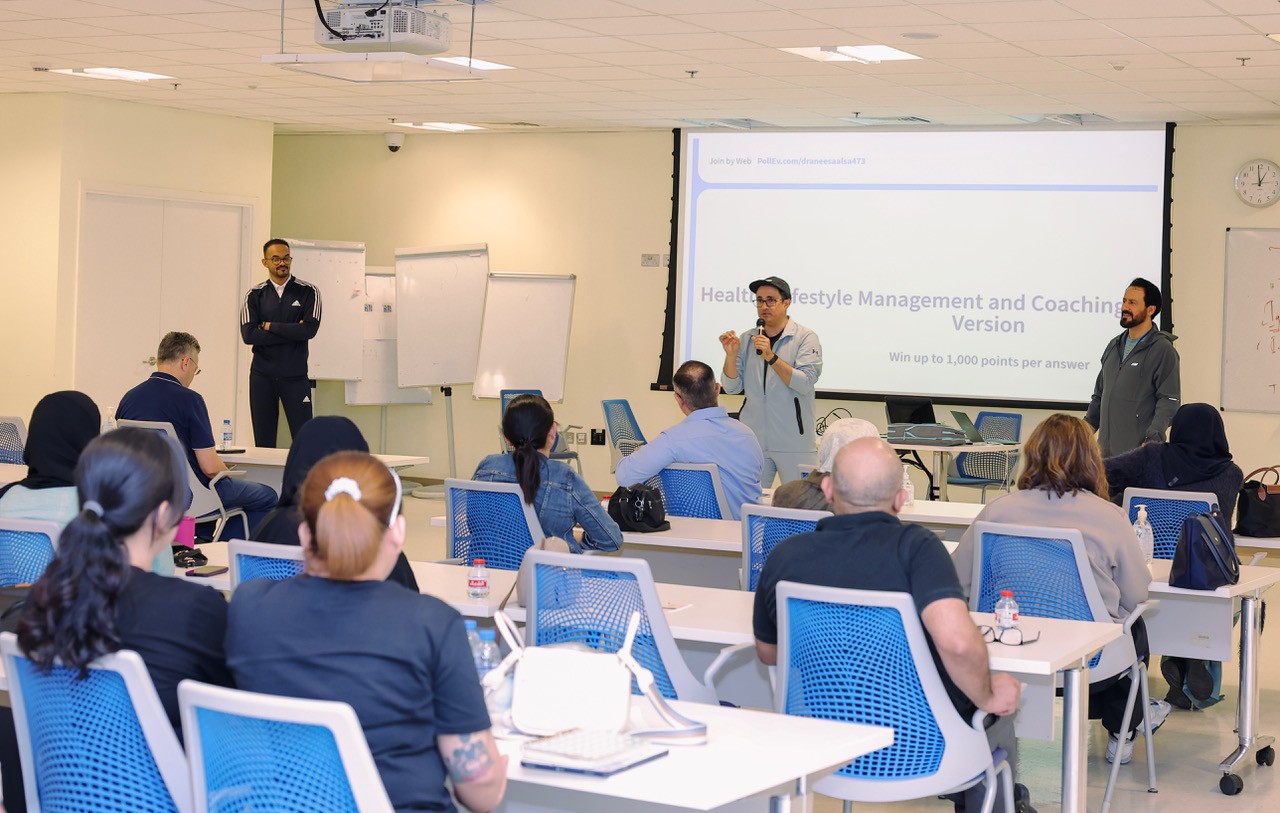Wellness Training Program for Healthcare Professionals at the Primary Health Care Corporation

The Primary Health Care Corporation’s Wellness Program conducted a series of interactive, face-to-face training sessions accredited by the Ministry of Public Health’s Department of Healthcare Professions through Work Force Training (WFT). Held on Saturdays across three health centers, the workshops engaged over 180 PHCC staff and focused on key wellness concepts and clinical competencies aimed at strengthening lifestyle-related delivery services.
The workshop aimed to equip attendees with a clear understanding of the effectiveness of healthy lifestyle interventions in reducing NCD risk factors, supported by evidence-based strategies. Participants learned to identify eligibility criteria for wellness services and understand key assessment components. They explored the full range of services available at wellness centers and reviewed the referral process, including physician assessment documentation and scheduling.
The session covered the principles of exercise prescription, emphasizing the exclusion of absolute contraindications and the need for further evaluation when necessary. Discharge criteria, documentation standards, and follow-up planning were also addressed. A detailed briefing was provided on the roles and functions of each wellness section, including the Healthy Lifestyle Clinic, Health Coach Clinic, Exercise Physiology Clinic, Wellness Gym, Swimming Pool, Massage Services, and Sauna/Steam Room.
Dr. Maha R H Alnaemi, a senior family medicine consultant and Muther Wellness Center In-charge Said” About Referral Pathways: Effective referral strategies are essential for ensuring patients receive the appropriate care. Primary care physicians should establish strong relationships with specialists and other healthcare providers to facilitate timely and effective referrals. Utilizing technology to integrate referral management into electronic medical records (EMRs) can enhance the efficiency and accuracy of the referral process.
Dr. Anees Alyafei, a community medicine consultant and Leabaib Wellness Center in-charge, Said about Updated Evidence of Healthy Lifestyle Modifications: Recent studies highlight the effectiveness of behavior change techniques in lifestyle interventions. Techniques such as goal setting, feedback, and monitoring, and social support have been shown to improve health behaviors and outcomes. Programs like the Healthy Lifestyle Community Program have demonstrated significant improvements in participants' quality of life through comprehensive lifestyle interventions.
Dr Ahmad Alhamdani, Associated Family Physician and Umm Salal Wellness Center In-charge Said about the Importance of Lifestyle Changes: Adopting healthier habits can significantly reduce the risk of chronic diseases such as obesity, diabetes, and heart disease. Regular physical activity, balanced nutrition, and adequate sleep are crucial components of a healthy lifestyle. These changes not only improve physical health but also boost mental well-being and the overall quality of life.
Dr. Mohamed Bala, Community medicine specialist and Al Ruwais Wellness Center In-charge Said about Wellness Referrals: Exercise and physical activity have tremendous health benefits; However, some medical conditions may need to be assessed by a specialized physician before starting exercise. This will help to design an appropriate exercise prescription which will ensure clinical effectiveness of the exercise program, patient safety and avoidance of potential harm as well.
In summary, the Primary Health Care Corporation’s Wellness Program successfully delivered accredited, interactive training sessions reinforcing the vital role of lifestyle interventions in preventing and managing non-communicable diseases. The workshops deepened attendees’ understanding of wellness service eligibility, referral pathway, and the multidisciplinary functions of various wellness services. Emphasis was placed on safe, individualized exercise prescription and effective discharge planning.
Expert insights from clinical leaders underscored the importance of proper integrated referral pathways, evidence-based behavior change strategies, and the holistic benefits of adopting healthy lifestyle habits. The sessions highlighted the value of collaboration, ongoing assessment, and tailored interventions to drive long-term wellness outcomes for all wellness service recipients at the Primary Health Care Corporation.
These efforts reflect a strong commitment to enhancing community health through proactive, people centered care.